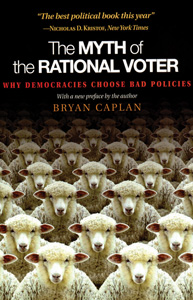THE MYTH OF THE RATIONAL VOTER
Why Democracies Choose Bad Policies
Paperback
He shows how people have these biases (i.e., anti-market, anti-foreign, "make-work," and pessimistic) not only in economic matters, but in the closely related world of political choices as well. The book also explores the similar themes of the psychological plausibility of such "rational irrationality," and of how voter irrationality offers a more realistic picture of democracy. Scores of tables and graphs throughout provide both the data and analysis.
“The best political book this year.”–Nicholas D. Kristof, New York Times
“Caplan thinks that democracy as it is now practiced cannot be salvaged, and his position is based on a simple observation: ‘Democracy is a commons, not a market.'”–Louis Menand, The New Yorker
“One of the two or three best books on public choice in the last twenty years.”–Tyler Cowen, Marginal Revolution
“Like a few recent best sellers–Freakonomics, The Tipping Point, The Wisdom of Crowds–The Myth of the Rational Voter unwraps economic theories and applies them to everyday life. Mr. Caplan’s thesis, though, lacks any semblance of a compliment: The ‘unwisdom of crowds’ is closer to his point. He believes that the American public is biased against sensible, empirically proved economic policies about which nearly all economists agree. Voters, he says, are not just ignorant in the sense of having insufficient information. They actually hold wrong-headed and damaging beliefs about how the economy works.”–Daniel Casse, The Wall Street Journal
“[P]rovocative.”–Elsa Dixler, New York Times Book Review
“The Myth of the Rational Voter usefully extends the discussion [about democracy] by linking it with ‘public choice’ theory. . . . Public choice theory faces a dilemma. A rational and self-interested person has no incentive to study political issues, as the chances of his or her determining the outcome are negligible. This has become known as ‘rational ignorance’. Caplan maintains that the reality is much worse. He shows that voters are not just ignorant but systematically biased in favor of mistaken views.”–Samuel Brittan, Financial Times
“Caplan is right to detect a stubborn irrationality in ordinary voters and he correctly points out to his rational choice colleagues that their models are hopelessly unrealistic.”–Martin Leet, Australian Review of Public Affairs
Quantities are limited.
| Publisher | Princeton University Press |
|---|---|
| Pages | 276 |
| Edition | 2007 paperback edition |
| Grade | 10 and up |
| ISBN | 9780691138732 |

